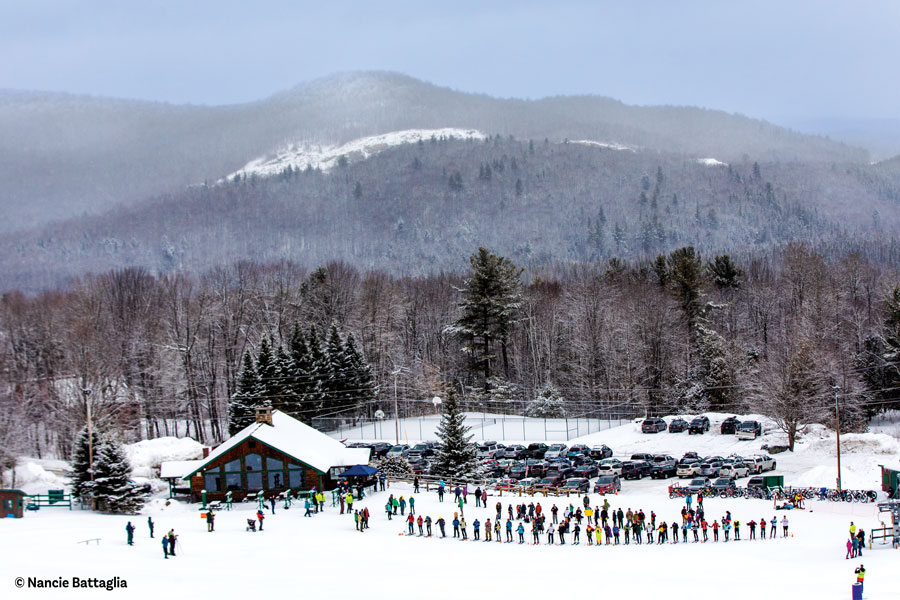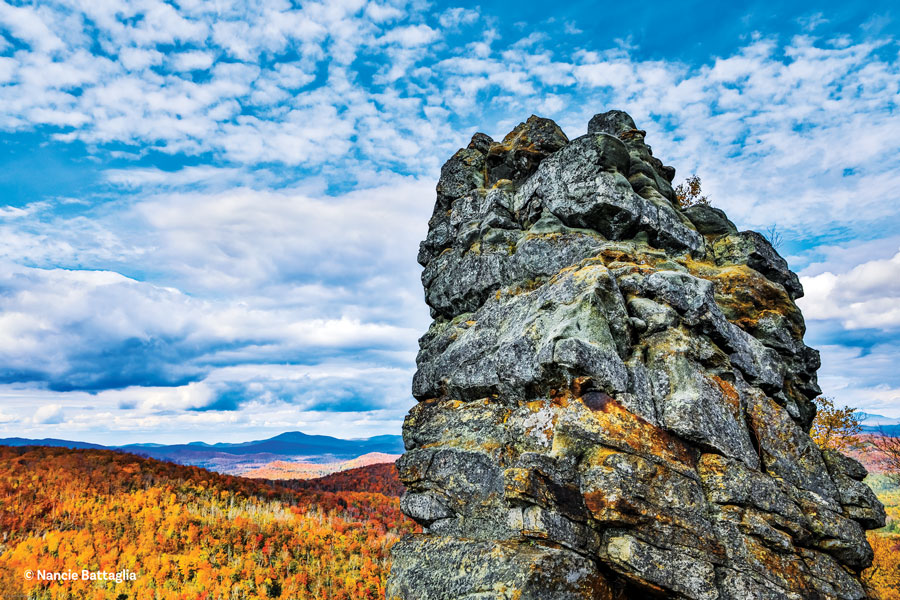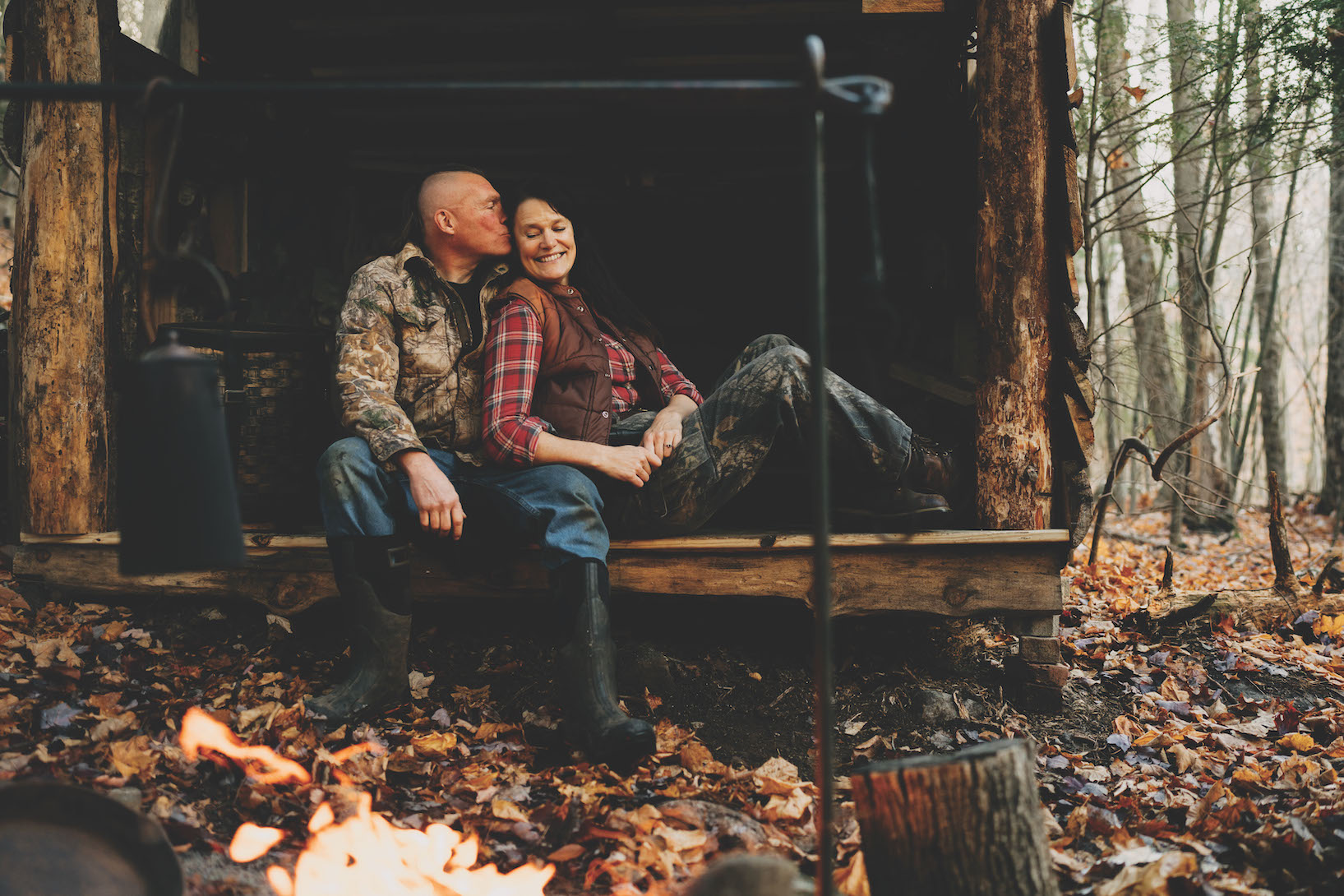Photograph by Summer Dorr
Turning a mushroom into a cottage industry
It’s a bright summer day, but the forest surrounding Tupper Lake is cool and dark. Garrett Kopp, the 20-year-old founder and CEO of Birch Boys—a product line of teas, lotions and body balm—is explaining how different types of mushrooms appear throughout the year, when something catches his eye. He suddenly veers off the path mid-stride and heads directly for a white birch tree, its pale bark popping against the greens and browns of hemlocks and white pines.
High up on the tree’s trunk, just out of reach, there’s a black, charred-looking mass that’s roughly the size of a two-liter soda bottle. Kopp looks up at the inelegant growth and laughs to himself. “That’s always the way with chaga,” he says. “It grows just out of reach.”
For the first couple of years that Kopp and Birch Boys co-owner Marko Jukic were in business, it seemed the amount of chaga they needed was always just out of reach. New orders often required a frantic foray into the woods in search of the elusive fungus, which is harvested, dried and then ground up to make Birch Boys products.
It’s odd to think of chaga (Inonotus obliquus), a parasitic fungus that grows primarily on birch trees, as something people buy to rub on their skin. But the peculiar organism is loaded with vitamin D, beta glucans and melanin, which gives it its characteristic dark color. As a hot drink, Kopp says, chaga delivers more antioxidants than açai berries and blueberries combined.
Chaga’s purported benefits to humans don’t extend to birches. After the parasite gets in through a break in the bark, it begins robbing its host of nutrients, a process that can span more than 80 years.
There’s a weird side to chaga, too. Kopp explains that a mushroom is actually the fruiting body of a fungus. Many mushrooms grow on trees and along the forest floor while the fungus remains hidden, but chaga works the opposite way. Its fruiting body develops inside the tree and is rarely seen, as it only bursts forth after the tree is dead. The dense, knobby mass Kopp collects is the mycelium—the actual fungus—which in other species is a thready, vegetative growth inside the trunk.
The idea to sell chaga started soon after a 15-year-old Kopp pulled a pitcher of what he assumed was iced tea from his grandmother’s refrigerator at her home in Tupper Lake. He was hot from mowing the lawn and gulped it down before realizing the drink wasn’t what he expected. This tea had a uniquely mild, earthy flavor, and he liked the way it made him feel.
“Drinking it really gave me a motivational energy,” Kopp says. “You don’t get a physical energy like with caffeine. Instead, the polysaccharides in chaga help our bodies convert nutrition into energy.”
Kopp’s grandmother, Sally Kopp, walked in and told the puzzled boy that he was drinking a fungus she had been introduced to during a guided foraging trip. Sally had unwittingly passed her newfound fascination on to her grandson, who soon became a tree-scaling, chaga-harvesting master.
Sally’s dining room table morphed into a fungus drying station. In 2015, Kopp dubbed his product Birch Boys and began attending farmers’ markets and festivals around the region with his grandmother, who sold knitted mittens and scarves.
“I was basically selling brown mushrooms in paper bags and sandwich bags,” Kopp says. “It was like a glorified lemonade stand.”
Kopp graduated from high school in Tupper Lake a year early and went to Clarkson University, in Potsdam. There he met other budding entrepreneurs and felt inspired to take his own endeavor to the next level.
He took a semester off from school to launch the business. He made a bunch of chaga teabags, loaded up his car and drove 32,000 miles throughout the Northeast, seeking stores to carry the product. A couple of chain stores, along with some smaller businesses, agreed to stock his tea, and it quickly became apparent that operating with paper invoices out of a rented basement in Tupper Lake was unsustainable. Kopp and Jukic decided they needed to upgrade.
“It became stressful because we were selling more than we had in stock,” Kopp says. “The whole thing was going to implode if we didn’t do something.”
He decided to leave school altogether, and he and Jukic launched a crowdfunding campaign that raised $8,000. (They had previously won several competitive grants, including $25,000 from the Wallace H. Coulter Foundation.)
In April, the Birch Boys store opened on Park Street in Tupper Lake. A large terrarium dominates the main room, its humid micro-environment filled with mosses, plants and, of course, mushrooms. Pet tree frogs hide among the foliage.
Along the walls are tributes to chaga—a birch log here, a poster-sized infographic there—mixed among the store’s merchandise. Some of the items are made in collaboration with other area businesses, including chaga skincare products by Parishville-based Adirondack Fragrance Farm.
But the basement drying room is where things really come into perspective. Inside, chaga is piled on shelves, where it must be dried for at least 72 hours before it can be used. Several dehumidifiers keep the air dry to prevent mold from forming.
Kopp disappears for a moment and returns with a particularly large, 30-pound piece of fungus. It looks like a humongous lump of charcoal, and Kopp says it’s about half the weight of the heaviest piece he’s ever seen.
Not only is fresh chaga heavy, it’s also hard. Just outside of the drying room is an old industrial meat grinder used to break down the chaga.
There’s plenty of chaga to grind. As word spread about the business, nature lovers began bringing it to Kopp, a luxury he didn’t have a few years ago. Now there are as many as 28 people—foresters, loggers and rustic furniture makers—collecting the chaga they find during their travels. Sustainable harvesting is a top priority for Birch Boys, so anyone taking chaga has to leave 15 percent, or about two inches, of the fungus on the tree so it can regrow. It’s illegal to harvest chaga on state lands.
Kopp is now focusing on building a database of the GPS coordinates of every chaga tree he and his foragers find. He recently finalized a deal with a local landowner who has large birch stands on his 220,000-acre property. The goal is to put lot numbers on Birch Boys tea boxes so consumers know exactly where the chaga was harvested.
Kopp’s beloved grandmother has since passed on, but in a Tupper Lake backyard there’s still a lone birch tree with a chunk of just-out-of-reach chaga growing on its trunk. Five years ago that tree, and the woman who lived in the house nearby, inspired a teenage boy to climb and grow an innovative business.
The Birch Boys store is open Tuesday through Saturday, 10 a.m. to 6 p.m., at 123 Park Street, in Tupper Lake. Learn more at (518) 299-9620 or www.birchboys.com.























